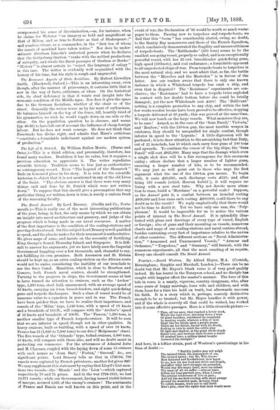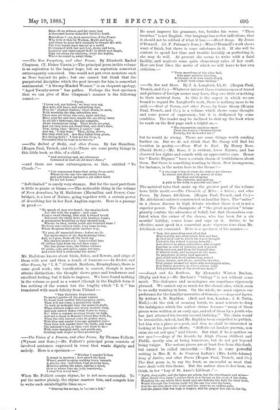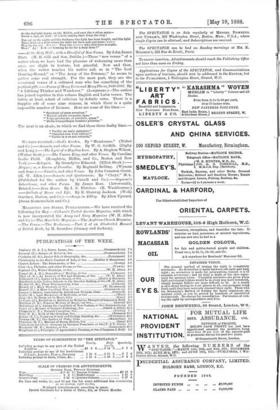POETRY.—David Westren. By Alfred Hayes, M.A. (Cornish, Birmingham ; Simpkin
and Marshall, London.)—There can be ne doubt but that Mr. Hayes's blank verse is of very good quality indeed. He has learnt in the Tennyson school, and no disciple has caught with happier effect the master's manner. The hero of this tale in verse is a manly, vigorous, country clergyman, who, after some years of happy marriage, loses wife and children, and with them loses for a time his hold on truth, but afterwards recovers his faith. It is a story which is, perhaps, scarcely distinctive enough to be BO treated; but Mr. Hayes handles it with power, and if the whole is scarcely all that could be wished, has worked into it some effective passages. Here is a little riverside picture
Thus, all too soon, they reached a lovely nook, Where the loud river, storming down a stair Of giant boulders, smothered its complaint In meeting woods, whereon a film of mist Slept like the bloom upon a purple grape. There sat her father, busied with his brash, Seeking in vain to catch the subtle play Of light and shadow, as the great white clouds Sailed over, and between their frowns a world Of gradual hues, a million tinted boughs Answered the sunlight."
And here, in a loftier strain, part of Westren's questionings in his time of doubt :—
" Earthly justice may not weigh
The tainted blood, the atmosphere of sin, The inward agony ; but He, Who knows How fathered and forefathered, how begot In sin, bow sin was food and drink and breath, And after what hard struggle sin prevailed, Would stay His angry hand, were sin indeed The cause of all we suffer.—Almost tears Soften my long-parohed eyes, when I recall The piteous tenderness of love in pain ; And yet the sea-bird circling with short sweeps Around his wounded mate, divinely blind To selfish danger, wails not to call forth Man's pity, since the sights that most would move
Have oft no witness, and for every tear A thousand hearts unheeded bleed to death.
Marvellous P—ay, most marvellous, if the Power Who wills it thus be Wisdom, Might and Love. And there be none with strength to thwart His will. The very beasts must marvel at a world So crammed with fair and foul, desire and hate. Laughter and tears—good God! to think men laugh, Ripping along the shallows, while the depths, Where no sound is, await them."
—The New Purgatory, and other Poems. By Elizabeth Rachel Chapman. (T. Fisher Unwin.)—The principal poem in this volume is an aspiration to the larger hope, but an aspiration somewhat extravagantly conceived. One would not put even monsters such as Nero beyond its pale ; but one cannot but think that the purgatorial discipline which the poet invents for him is somewhat sentimental. "A Strong-Minded Woman" is an eloquent apology, "Aged Twenty-seven" has pathos. Perhaps the best specimen that we can give of Miss Chapraan's manner is the following sonnet :—
"Fairs.
'I know not, nor believe,' we hear men say, Men with still faces, and unflinching feet, Who the ' cloaked shadow,' silent Death, to meet, Walk manfully the dim, untrodden way. These men are those who ever, night and day, Have wept for and have sought the one thing sweet In all life's bitterness, the one complete, Alone harmonious thing. Their heads are gray, And yet they have not found God, seen God's face. Now, dying, they 'Believe I cannot' sigh And say, `I only hope.' They, dying, grieve, But they rebel not. Are they fallen from grace, Not having faith ? I fear not for them, I, Persuaded that to hope is to believe."
—The Ballad of Bir,dji, and other Poems. By Ian Hamilton. (Regan Paul, Trench, and Co.)—There are some pretty things in this little book, as this, of a child,— " And stretching vast, my afternoon
Contained at least an old mau's June,"
—and there are some extravagances, as this, entitled "To Clouds :"—
"Fair evanescent forms that spring from earth Whene'er the sun does amorously burn, And soft-limbed sea bears a yet softer birth To his hot kisses."
"Soft-limbed" is surely very strange. But for the most part there is little to praise or blame.—The noticeable thing in the volume of Nova Arundines, by H. Hailstone (Macmillan and Bower, Cam- bridge), is a love of Nature, going together with a certain power of describing her in her East Anglian aspects. Here is a passage in proof :— " No speech of men was heard ; the reaping-hook
Lay idle with the poppies : only came From a swart throng, that nigh a twined brook Did court the chilly dews with heedless frame, A murmurous breathing as they upward look.
Whence be they, tawny youth and wrinkled dame ? We know not—outcast souls, they come to-day, Whom Hesperus shall guide another way.
'Tis past, th' enameled drove; before me lie The misty-shores of the flag-flowering Ouse; And, as I gaze, from off the lurid sky The shadow-surges roll long-levelled hues Of saffron light from the red Bast reply ; The dim plains clear, the lifeless avenues Of °Biers, sails, and spires, again are born, And every bird is antheming the morn."
Mr. Hailstone knows about birds, fishes, and flowers, and sings of them with now and then a touch of humour.—In Rachel, and *their Poems, by "I. S." (Cornish Brothers, Birmingham), there is some good work ; the versification is correct, though it never attains distinction ; the thought shows grace and tenderness and excellent feeling, but it fails to impress. We have found nothing in the volume so good as a sonnet (though in the English form it has nothing of the sonnet but the length) which "I. S." has translated with much felicity from Uhland :— "Tun COUNTRY' CLERGYMAN.
To parte] spirits—if the power remain To tread their earthly dwelling-place again, Thou wilt not come, a melancholy shade To walk at midnight thro the moon-lit glade, When stillness reigns and weary mortals sleep, And only Borrow wakes—that wakes to weep ; No! when a summer morning breaks on high, And not a cloud in Heaven's broad blue doth lie, When the rich harvest rears its golden store, With blue and scarlet blossoms sprinkled o'er— Then thou wilt wander thro' the fields, and view The labourer's toil, as thou wert wont to do— With voice benignly mild, and gentle eye, Greeting each reaper as thou passest by."
—The Vision of a Passion, and other Poems. By Thomas Folliott. (Wyman and Sons.)—Mr. Folliott's principal poem consists of involved sentences expressed in verse that wants dignity and melody. Here is a specimen :— "Whither I wandeed then Is wrapt in mystery ; how gairid the bank Where, seated weeping scalding tears, beneath A gloomy sky, 'mid blasts that piercing beat, Moaning among the pines, sighing a mead, Slow to whose time my body ceaselessly, I away'd in sorest woe:'
When Mr. Folliott essays rhyme, he is not more successful. To put the matter plainly, the rhyme masters him, and compels him to write such unintelligible lines as,—
" Braving the savage, to Lecome a foil." He must improve his grammar, too, besides his verse. "Thou breathes" is not English. Our language has so few inflections, that it should not be robbed of what it has.—Heart Songs. By Jessie O'Donnell. (G. P. Putnam's Sons.)—Miss O'Donnell's work shows want of finish, but there is some substance in it. If she will be content to spend her time and trouble lavishly on perfecting it, she may do well. At present she seems to write with a fatal facility, and neglects some quite elementary rules of her craft. Here are four lines the metre of which we will leave to her own criticism :—
" From snowdrops at the altar laid, Like pure maidens kneeling, As though of its own sound afraid, A fairy voice comes stealing."
On Sea and Shore. By J. A. Langford, LL.D. (Regan Paul, Trench, and Co.)—Whatever interest these reminiscences of travel and pictures of foreign scenes may have, they owe little or nothing to their metrical form. As this is the aspect in which we are bound to regard Dr. Lang,ford's work, there is nothing more to be said.—Saul of Tarsus, and other Poems, by Isaac Sharp (Regan Paul, Trench, and Co.), is a volume which shows some thought and some power of expression ; but it is disfigured by some crudities. The reader may be inclined to shut up the book when he reads on the first page such a triplet as,— " The concentrate sunshine smote
From the heaven's furnace-throat Fiercely, but he heeded not ;"
but he would do wrong. There are some things worth reading further on. But we do not think that Mr. Sharp will find his vocation in poetry.—From West to East. By Henry Rose. (David Stott.)—Mr. Rose, it is evident, loves Nature, and has observed her sights and sounds with an appreciative care. Hence his "Rustic Rhymes" have a certain charm of truthfulness about them. But there is something wanting in them. How incongruous, for instance, is the metre here to the theme !— "A crossing is traced where the waters are thrown In sluices and shallow., by masses of stone Dividing and breaking
The currents, and making A path to the delta so peaceful and lone."
The metrical tales that make up the greater part of the volume have little merit.—The Chronicle of Mites : a Satire ; and other Pieces. By James Aitchison. (Regan Paul, Trench, and Co.)— Mr. Aitchison's satire is constructed on familiar lines. The " mites " in a cheese discuss in high debate whether there is or is not a superior power. The champions of "the great negation" trium- phantly confute the advocates of belief, but find themselves con- futed when the owner of the cheese, who has been for a six months' holiday, comes home and sups on it. Satire, to be effective, must speak in a somewhat more vigorous tone than Mr. Aitchison can command. Here is a specimen of his manner :— " Now, this prevailing over all at last
Mite-worship was established, firm and fast, AS that high salt to which the ripest thought United to the richest learning brought ; And praised by grave authorities, who reigned Supreme in seats of learning, now it gained
Wide currency, and from the learned class
It filtered down, and leavened all the mass.
Its proselytes in every land appearei, And, filled with fresh enthusiasm, reared Fanes, shrines. and altars, sacred to the rites That proper seemed for mites who worahipped mites, And stately minsters, in whose solemn shade
Full proclamation of the creed was made."
—Joseph and his Brethren. By Alexander Winton Buchan. (Digby and Son.)—Mr. Buchan's " trilogy " is not without some merit. The dialogues and monologues are sometimes vigorously phrased. We cannot say as much for the choral odes, which seem to us sadly wanting in form. On the whole, we must express our preference for the familiar narrative of Genesis.—Lays and Lyrics. By Arthur A. D. Bayldon. (Bell and Son, London ; J. R. Tutin, Hull.)—At the risk of seeming harsh, we must venture to deny the indulgence which the author claims because "many of these pieces were written at an early age, and all of them by a youth who has just attained his twenty-second. birthday." The claim would be irresistible, indeed, had Mr. Bayldon been compelled to publish. Let him win a place as a poet, and then we shall be interested in looking at his juvenile efforts. " Difficile est laudare puerurn, non enim res est sod spas," said Cicero. But what if he is neither yes nor apes 2—Lays of the Seaside, by Aliph Cheem (Gilbert and Field), mostly aim at being humorous, but do not get beyond being vulgar. The serious pieces are at least free from this fault, but cannot be called suocessful.—There is some powerful writing in Mrs. R. S. de Courcey Laffan's (Mrs. Leith-Adams) Song of Jubilee, and other Poems (Kegan Paul, Trench, and Co.) The first poem is, to say the least, as successful as most that have dealt with this theme. But the author rises to her best, we think, in her "Lay of St. Anne's Lifeboat :"— "Night, deep night, and the babes are asleep, but the sweethearts and wives— (How should they sleep ?) gather thick in a throng on the crest of the down, Watching the sea where their loved ones are fighting the fight for their lives, Watch through the livelong night till the sun rise over the town, And the minutes grow into years and the years to an endless pain, And the glance that was hope is despair, and the prayer dies out on the lip,
As the daylight dawns on the Ribble, and over the restless main— Never a sign, ah God ! of a boat coming back from the ship !
For out in the night and the darkness the fight has been fought, and the light Rises Wilt on a field where the fight has been lost and been—won- Won by the sea. Not so ! They are winners who died here to-night. Won ? Ay! Is it not winning to die for a duty done ?"
—At the Holy Well ; with a Handful of New Verses. By John James Platt. (M. H. Gill and Son, Dublin.)—These "new verses" of a writer whom we have had the pleasure of welcoming more than once, are slight in texture, but graceful. Now and then, when the writer touches his native soil, as in "The Lost Hunting-Hound," or "The Army of the Potomac," he seems to gather some real strength. For the most part, they are the occasional verses of a cultured man who has something of the poetical gift.—Poems of Many Years and Many Places,1839-1887. By "A Lifelong Thinker and Wanderer." (Longmans.)—The author has joined together in this volume English and Latin verses. The latter, at least, admit of criticism by definite rules. There is a Sapphic ode of some nine stanzas, in which there is a quite impossible number of licenses. Here are some of the lines :— " Snscitant ad pura sereniora."
" Meeniis saltare cremante ligno." "Virgo prmlucens, et rurabilie, quern." "Stella tracquillaque homines polornm."
The next is an alcaic, in which we find these three faulty lines :—
" Insidirelne maize parantnr." "Omnibus esse locis eidetnr." " Cordis in ace mei rotunda."




































 Previous page
Previous page